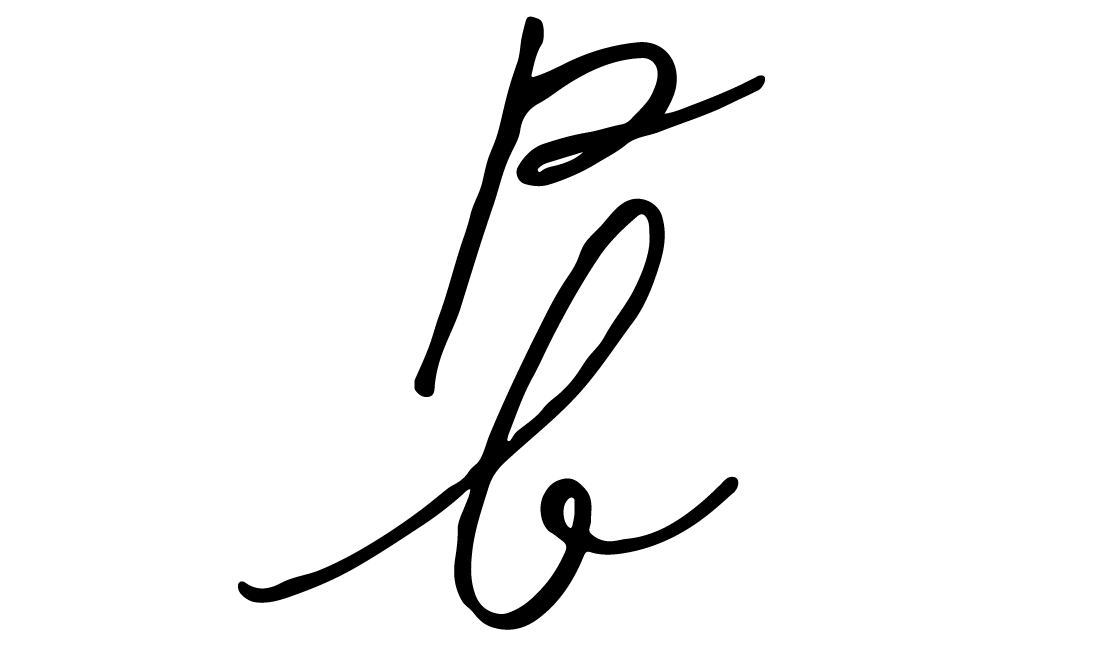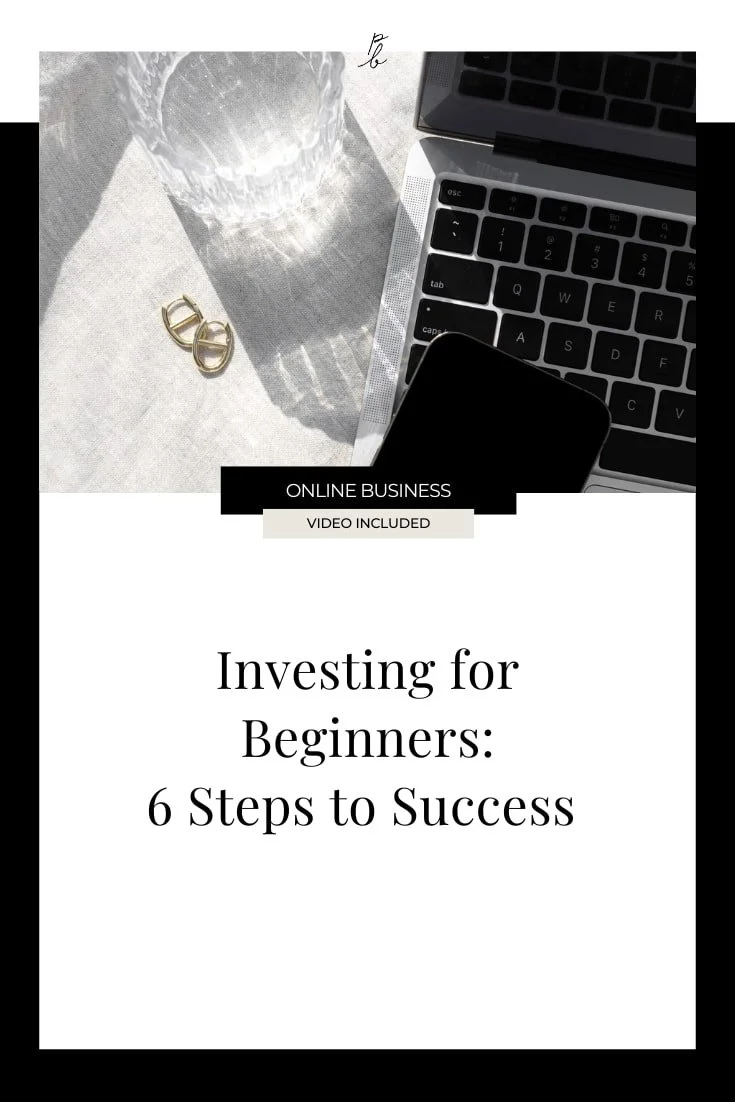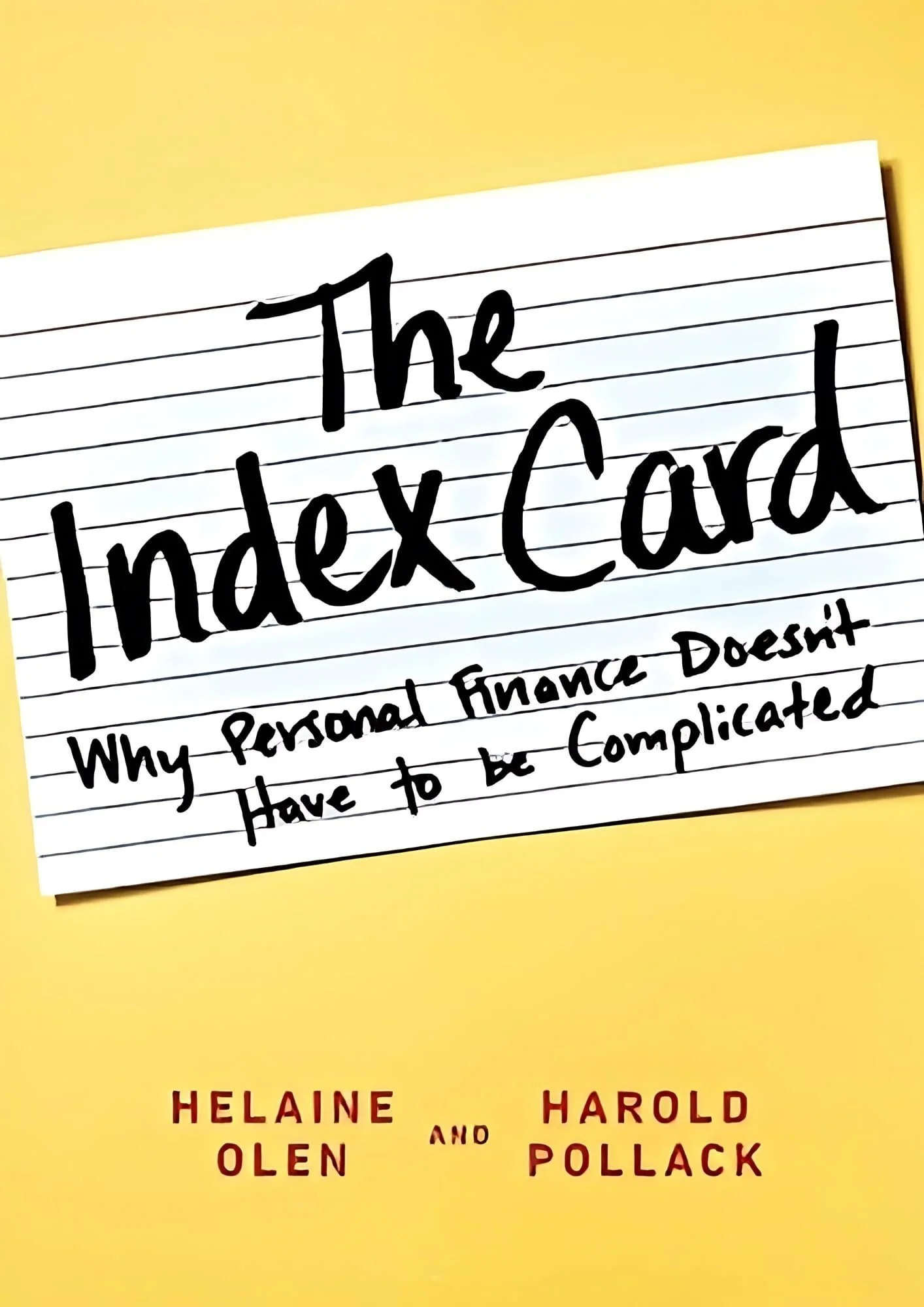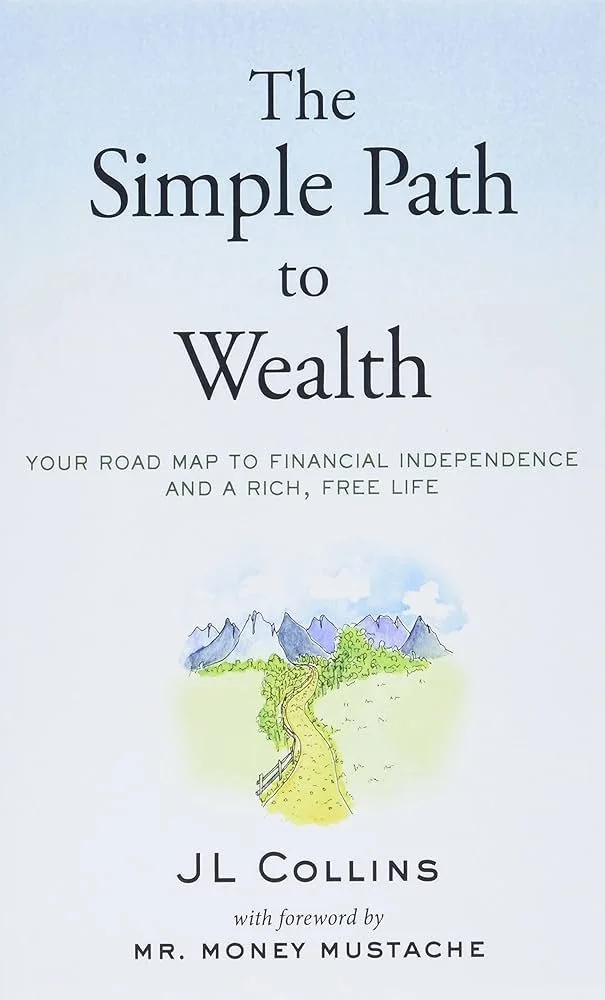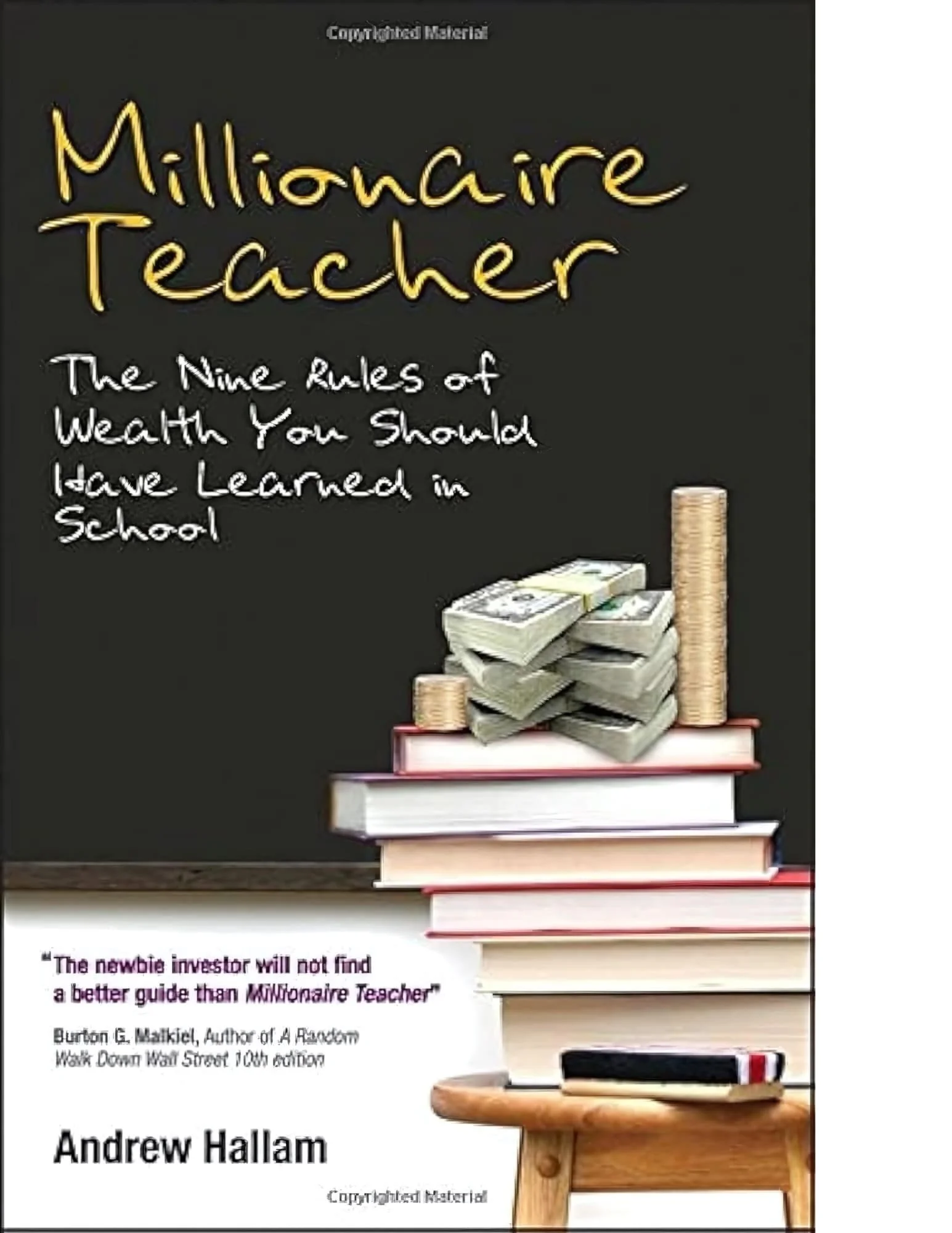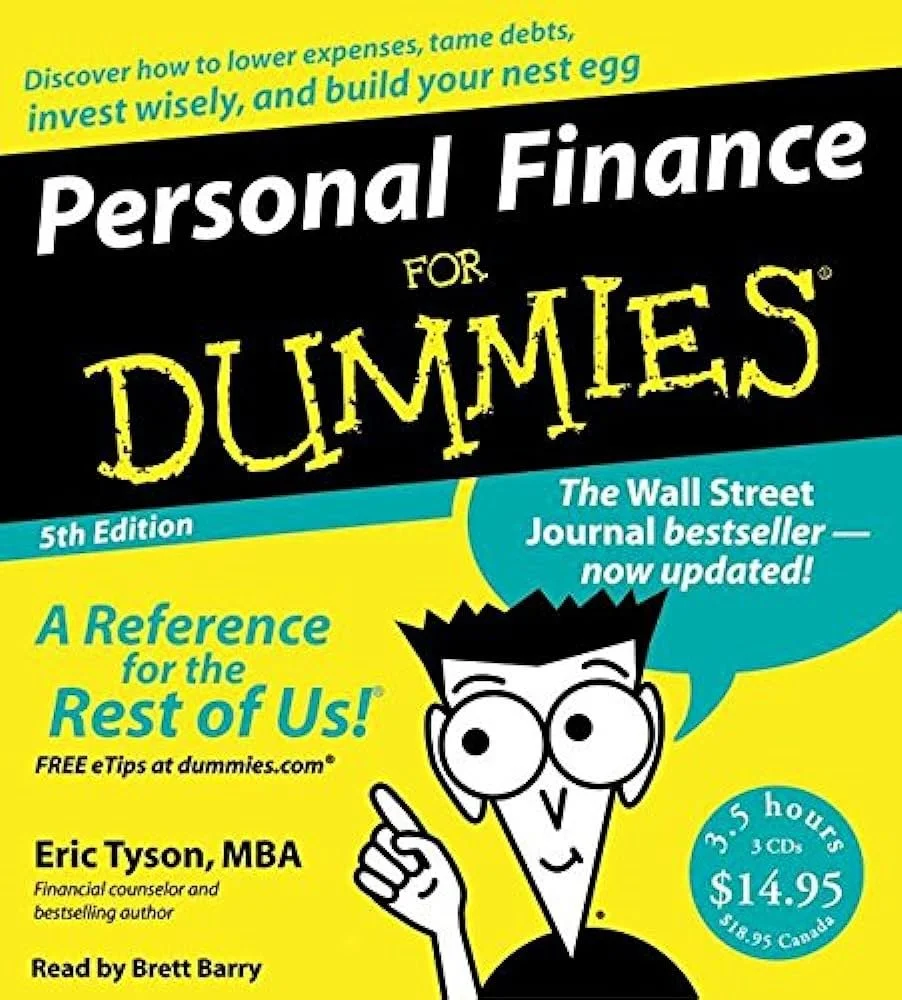Investing for Beginners: 6 Steps to Success
Prefer to watch?
Here’s the video!
Mentioned in the Video:
*Yup - that’s an affiliate link! My margarita fund thanks you kindly!
Rather read all about it?
While this blog is personally a little uncomfortable for me to write AND probably won't be the most successful views-wise, it's important to me to genuinely serve my dear audience.
I think it’s of massive service to write about investing: how a normal person who has no interest in spending time managing investments, manages to make their money grow itself. 💸
Here are the 6 steps that took me from not having a clue how to invest, to being confident in what I'm doing and feeling secure in knowing I'm doing something exceptionally important and impactful for my future self.
Step 1: Educate yourself with books & podcasts.
Even at the very beginning, I knew enough to know that, it probably wasn't a great idea to just hear from a friend "I invested my money in X way" and do the same thing.
I didn't want to be the blind following the blind.
Financial health is one of those key areas of life where IF you get it right, it can be a MASSIVE blessing on your life. So it’s definitely worth spending some time learning about.
I did some Googling on the best finance books and honestly read about ten of them. I also started binge-listening to reputable podcasts on the topic too.
Here are my top book recommendations:
#1: The Index Card by Harold Pollack and Helaine Olen
This book is perfect if you're completely new to finance and want a beginner-friendly, quick guide on the key points you need to know about.
Author Harold Pollack was fed up with all the confusing, conflicting financial advice out there and said that what people REALLY need to know to manage their own personal finances and retire comfortably could fit on a single index card (hence the name of the book).
#2: The Simple Path to Wealth by JL Collins.
This book is another super easy read and gives a perfect introduction and explanation of investing.
Author JL Collins explains the stock market, its rises and falls, bull markets, bear markets, bonds, index funds, asset allocation, dollar cost averaging and more.
Basically all those confusing financial terms you've heard and nodded along pretending to know what they mean, this book explains them simply. 😅
By the end of the book you'll not only understand investing, how to do it properly and how to hold your nerve when the market goes wild, but also a bit of practical advice on picking investments too.
With other investment books I felt like I read them and understood the concepts, but I didn't know what to practically do next. This book is one of the few that covers this vital bit of information as well.
#3: The Little Book of Common Sense Investing by John C. Bogle.
This book is where things get a bit more advanced and complex.
It was written by John C. Bogle - he created the index fund (a super popular financial tool and investment option).
He also is the founder of Vanguard, a company and platform that I actually chose to invest my money with.
This book goes in depth into understanding the market, and gives detailed examples on what would have happened with your money had you invested it different ways in the market over the years.
If you listen to any advice on finance these days you'll hear that index funds are all the rage…but you might not quite understand why.
I think it's super important for you to understand WHY you're making a decision instead of just following what everyone says to do.
By the end of the book you'll also be an index fund advocate and you'll truly understand why they're so incredible and such a fantastic tool for investing your money. This will be vital information to be equipped with when the markets take a downturn and uneducated investors pull out at just the wrong time.
#4: Millionnaire Teacher by Andrew Hallam
This one is a book which is for you if you're in a very specific situation like me.
It was written by a teacher who taught at international schools and whole moved countries every few years.
so it’s specific advice for anyone in a similar situation.
I'm not a teacher at an international school and I would imagine most of you aren't either.
But if you're digital nomading or moving countries a lot (like teamie Helen who recently blogged all about it) , basically just ignore the word teacher in the book, and it's perfect for you!
I MOVED ABROAD AFTER COLLEGE AND HONESTLY HAVE NO IDEA WHICH COUNTRY I'LL BE IN WHEN I RETIRE, WHICH MAKES INVESTING A BIT MORE COMPLICATED.
A lot of countries have investment vehicles or wrappers which are a tax efficient way to save for your future, things like 401ks in the US, RRSP's in Canada, and pensions in the UK.
If you're always moving or are not sure where you'll end up like me, you can't really take advantage of these and it makes investing a lot more tricky, but not impossible.
#5: Personal Finance for Dummies
I also recommend your country's version of Personal Finance for Dummies.
There are a few other things you should think about and do before you even get into investing, a few insurances that are advisable, some recommendations on debt if you have any.
These books give you a quick & simple explanation of the different tax efficiencies & quirks on investments in your own country that you should know.
I also listened to a few financial podcasts….
Dave Ramsey's The Ramsey Show and also when I was in the UK I was listening to The Meaningful MoneyPersonal Finance Podcast which had incredible UK-specific advice too.
These shows, specifically Dave's I find really motivating and keeps me excited about doing something positive for my future self, when of course our automatic default is to simply live in the moment and go after the immediate rewards.
Once I felt like I knew enough of what I was doing, noticed some consistent themes between these books and others, I next needed to take some action.
Step 2: Determine how much you can save each month.
Basically, decide how much you are able to invest.
The two factors I considered when determining this were AGE and BUDGET.
I looked at the age at which I was starting to invest, because that is a factor in what percentage of your income you need to save.
As for budget, it was about knowing what I could realistically put aside for investing while also putting money towards the other priorities in my life, like at the time putting money towards a wedding, a house down payment, and an emergency fund.
As different events have happened in my life, the percentage of my take home which I put towards investing has both gone up and down…and that's okay!
I have a final financial freedom number I'm working towards, and when I can put more towards it I'm excited to be able to reach that goal faster and when I can't, I remind myself it is what it is, and try my best to get back to a higher percentage as and when I can.
Psst…want more game-changing business and finance advice? Make sure to subscribe so you don’t miss anything!
Step 3 Pick your investment type.
This step is all about finding the investment type or vehicle which works best for you.
I considered a few factors when picking mine and figuring out what I wanted. This included figuring out what I DID NOT want my investment type to be:
❌ Time-consuming
wanted this to take next to no time for me to manage. So real estate or I know some people open an AirBnB as an investment was out for me. That also meant picking individual stocks was out too. And having money in a zillion different asset classes also wasn't great, because then I'd need to keep up with the laws & changes which might affect my different investments.
❌ Conservative
I was starting young-ish in my 20's so I could invest in riskier items, so the very conservative stuff like bonds weren't of interest to me.
❌ High Risk
But also I'm not a massive risk taker either, so really new investments like Crypto weren't of much interest either. I will say, I have a very very small amount of Bitcoin, but I only bought an amount which if I fully lost it, I wouldn't mind.
❌ High Fees
I had seen enough graphs and charts in these books to know that expense ratios, that is the fees you pay to own and hold the investments, might look small at say 0.75% or 1%, but those teeny percentages often result in a hundred grand or a few hundred grand more or less in your portfolio in the end. So I wanted the lowest fees on my investments possible too.
That left me with the investment type that most of the books recommended anyways: low cost index funds (ETF's).
With ETFs I could easily be diversified across different countries, industries, and even other investment types. I could in a way be in the real estate market without the hassle of it by having real estate companies within my index funds.
All with it taking me 5 minutes or less a month to buy stocks and call it a day!
At the very beginning, I made my life super simple, I just bought the index fund with the lowest expense ratio I could find which tracked the S&P 500, or the 500 biggest companies in America.
Since then I have every so slightly changed what I buy to align with where I think the world is going and to spread my investments out over more countries, but to start, I legitimately just did that, and honest, that investment has done exceptionally well for me.
A word on individual stocks…
I will say the one other thing I do have in my portfolio, more out of fun and interest than anything else is a few individual stocks.
I currently have some Squarespace, Shopify & Lululemon stock.
They say don't invest in anything you don't understand, and specifically with Squarespace and Shopify, I know the industry. I get what they offer and how they stack up against their competitors.
Okay, Lululemon was honestly just for fun. 🤗
These individual stocks are a very small portion of my portfolio. I mostly bought them because when I buy my ETF's, if I have a few dollars sitting in my brokerage account uninvested, I can buy these cheaper stocks to use up the extra sitting in the account.
Psst..just realize you might need to put a little more love into your business in order to generate the revenue you need to reach that next step of investing? I’ve got you covered with a free guide!
Step 4: Get a brokerage account & figure out how to buy an ETF.
In order to buy ETF's, stocks or anything of the sort, you’ll need a brokerage account.
Every country is different as to which brokerage account is best, and when I say best, basically I mean has the lowest fees and allows you to buy the investments you want.
I'm in Switzerland at the moment and chose Interactive Brokers and when I was in the UK I chose Vanguard.
I encourage you to do some Googling to see which brokerage account in your country has the lowest fees. 🔎
The next thing which I found honestly rather difficult was how to even buy what I wanted to buy.
I knew I wanted for example an ETF that tracked the S&P 500, but no book really goes into how to actually do that. It honestly took a fair bit of Googling to know once I logged into a brokerage account, how to find the ETF I wanted, understand what's called an ISIN number, which is a giant long list of numbers & letters which defines each ETF and then buy one.
Again, a tutorial on your chosen brokerage account can help.
Step 5: Buy investments & set up an auto-recurring purchase.
This is where you actually buy your investment.
This is usually done AFTER you pay yourself.
Psst..still unsure how much you should be paying yourself and how best to organize your money each moth? steal my payment routine here! 👇
Buying investments involves transferring money into my investment account and purchasing my chosen ETF's.
Right now I'm buying VOO, VGT & VEA, those are all Vanguard funds with very low expense ratios.
And if I have a few dollars left in the account, I might add a Squarespace or Shopify stock too.
I'm pretty sure there's a way to automate this step, but honestly I haven't gotten around to setting that up yet, but it's on my to do list as I know, the less of me involved, the better.
Step 6: Do whatever it takes to stay the course.
I listened to a few podcast episodes on Meaningful Money about behavioral finance and one of the biggest hurdles to long-term wealth is ourselves. Specifically ourselves making not great decisions.
A few of the best things we can do are:
Don’t be overly active: Do not look at your investment account. Just delete the apps from your phone and don’t look at it. Having easy access apparently makes people more likely to trade which is proven isn't a good long-term decision.
Think like an expert: When something happens and the market takes a hit I do one of a few things. I remind myself of what I learned in all of those investment books from Step 1. I remember how the market works, whats really happening, and what successful investors do in the face of a market scare. I'll sometimes go reread Tony Robbin's book Unshakeable which speaks specifically about this.
Stock on sale = Good: I always remember that when the market takes a hit, what's really happening is stocks are on sale, and that's a GOOD thing.
Now all these steps are great…but if you're still struggling with your money because that mindset of yours is leading you to all kinds of bad decisions, I had an incredible conversation with money mindset expert Catherine Morgan.
She'll help you overcome your self-sabotage, challenges with money conversations with your partner and more. Enjoy! 👇
You’ll Also Love...
How much does an online business cost to run? (My business cost breakdown)
Youtube vs Instagram vs Blog for Creative Entrepreneurs in 2024
Work-Life-Balance Advice from a 7 Figure Online Entrepreneur
How to start an online business in 2024: Complete step-by-step guide
Is it too late to become a Squarespace web designer in 2024?

